Propagating the Myth: The Hidden Cost of "Humane" Legislative Initiatives
A number of farm animal sanctuaries and other organizations that identify themselves as serving the cause of animal rights have stated online and elsewhere that they do not believe that any manner of using and killing animals can be fairly described as "humane." Many more animal advocacy leaders would echo such sentiments privately. Yet, paradoxically, in a context in which their choice will be aggressively publicized in all forms of media and become part of the historical record, many of the same individuals and their organizations have joined animal-exploiting corporations in endorsing "humane" farming legislative initiatives, putting their reputations behind a concept they have previously acknowledged as being inherently fallacious -- a myth.
Because animal advocacy organizations and prominent individual advocates are seen by the public as the natural adversaries of the industry, their participation lends a level of credibility to the concept of "humane" farming that no amount of advertising dollars can buy. This plays a critical role in the industry's long-term strategy of convincing millions of conscientious shoppers that the appropriate, logical, and socially responsible manner of expressing one's concern for animals raised and killed on farms is to purchase the "happy meat" products of "humane" farming.
Past experience has shown that when large national advocacy groups persuade local and regional groups to join these "humane" farming legislative coalitions alongside corporations that use and kill animals, they can put the leaders of these smaller groups at odds with some of their most committed volunteers and supporters.

In 2010, an Ohio-based grassroots organization made the controversial choice to join a legislative coalition called Ohioans for Humane Farms which included, among other endorsers, the "Great American Lamb Company." This decision caused a crisis of conscience for some of the organization's most experienced and dedicated advocates, as they felt they were being asked to choose between their loyalty to a beloved organization that their efforts over many years had helped build and their commitment to being honest with the public about the fraudulent nature of "humane" farming.
Swift efforts were made to "manage" those challenging the misleading nature of this industry-advocacy coalition. The pressure to conform, to do what felt wrong because once-trusted authority figures were saying it was necessary and right, profoundly damaged the idealism of some of those involved. Schisms opened up between people who had worked side by side for years and achieved much together. Eventually, a number of the organization's most capable and experienced volunteers made the painful decision to part company and start a new advocacy group. Their choice was powerfully affirmed when HSUS advertised a fundraising dinner for Ohioans for Humane Farms at which meat and dairy products from the very animals they claimed to be advocating for were served to potential donors.
Having received phone calls and emails from activists in Ohio who felt deeply violated by this being done in the name of animal advocacy in their state, I produced a video commentary titled "Silencing the Lambs: Fundraising for the Animals by Serving
Them for Dinner: The Myth of Humane Agriculture in Today's
Animal Advocacy Movement."
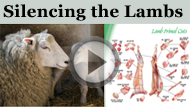
An aggressive and multi-faceted online campaign to marginalize this message was immediately carried out by employees of some of the advocacy organizations at the center of the legislative coalition. This had a dramatic chilling effect on the substantive dialog generated by the publication of this video, but not before many people had become more aware and expressed their opposition to what had happened.
Each individual, each group, large or small, that has come far enough on their journey to understand what it means to truly serve the cause of justice is irreplaceable. Those in leadership roles at national organizations have an unspoken obligation to encourage and protect the integrity of smaller organizations. To lead them instead into a position of moral compromise is a heavy act.
To make matters worse, these campaigns have recently concluded with backroom deals between advocacy organizations and the industry, preventing the measure -- for which a large number of advocates were persuaded to gather ballot signatures -- from ever seeing the light of day. The nature and degree of the compromises associated with some of these negotiated settlements have driven some animal advocates, already ambivalent about their participation, to anger and despair. Many feel that they were used as a means to an end, and that even the highly compromised goals they had been persuaded to accept had been traded away or sold out.
However disturbing and even bizarre the post-campaign rationalizations and rhetoric may be, the sense that a "victory" is being conjured simply by enthusiastic declarations of triumph from leadership figures increases the sense of cynicism amongst advocates, and widens the conflict between those who feel betrayed and those who feel a need to feel good about their hard work and sincere efforts.
And when such legislative campaigns end and the national groups move on to another initiative, local and regional organizations are left to deal with disillusionment and division, the often lingering consequences of acting against their own values. It is the activists, the animals, and the now falsely-reassured public who pay the real price of the "victory" that so enriches the coffers and prestige of the national groups responsible for creating these malignant scenarios.
As this is being published, a premature end has come for another state-wide legislative initiative whose very nature had, like the preceding one in Ohio, fomented conflict between local groups and some of their most committed members. Washingtonians for Humane Farms set up a situation in which some local animal groups who had publicly and quite emphatically declared that "humane" animal farming is indeed a myth were convinced to march under the "humane" farming banner alongside animal-exploiting corporations.

The deal which ended the legislative initiative in Washington was one struck between the Humane Society of the United States and the United Egg Producers, and in this case it is one with national implications. While HSUS and its supporters are presently declaring their agreement with the industry an achievement of historic proportions, other knowledgeable advocates, and even some advocacy organizations, find it to be the opposite, a disastrous capitulation, strategic blunder, and cynical manufactured "victory", yes, of historic proportions.
One of many troubling facts surrounding this situation is that a previous statement signed only one year ago (July, 2010) by HSUS, Farm Sanctuary and several other animal organizations appears to unequivocally condemn the very sorts of "enhanced cages" whose potential mandated adoption these same organizations are now touting as a development of historic proportions. HSUS also issued a report in which they stated, "While they do allow caged hens to engage in a larger array of natural behavior patterns, furnished cages do not enable hens the freedom of movement and environmental conditions necessary to achieve an acceptable level of welfare." Ironically, these prior representations were made when HSUS and other organizations were trying to sell the public on the virtue of "cage-free" eggs (See Truthiness is Stranger Than Fiction)
What tends to be lost in all of this is the long-term effect on members of the public, who are ever less able to distinguish animal advocates from animal exploiters, and ever more convinced that the purchase of "the right kind" of animal products is the appropriate expression of their genuine concern for animals.
We Get What We Give
It should not surprise us that those who have become accustomed to exerting utter control over the lives of billions of animals might develop a lack of respect for the intelligence of the public. Indeed, such cynicism has steadily spread throughout our society. Even experienced animal advocates fall prey to this disturbing mindset.
For example, in 2009, Norm Phelps, a noted author, and former staff member of the Fund for Animals and the Humane Society of the United States (HSUS), gave a conference presentation titled "In Praise of 'The New Welfarism." In it, he discussed his assessment of the many social and psychological barriers that impede "most people" from understanding and responding appropriately to the injustice of animal exploitation. Significantly, Mr. Phelps made these statements:
Most people are not like us. Most people are not activists for any cause, human or animal, and never will be. For most of us in the animal activist community, a switch flipped in our heads one day, and we could never see the world in the same way again. Our lives changed forever. But for most of the public, it does not work that way. They need to be brought along slowly, inch by inch.
…The public will have to be led gradually, indirectly, one logically inconsistent step at a time to this recognition of the evil that permeates our lives, our families, and our societies, so that it overtakes them before they can throw up their defenses.
Does it really make sense to assume that the same truths that awakened our own understanding and quest for justice are somehow beyond the grasp of most other people? Does it really make sense to presume that there is a different, deliberately distorted message that should be given by "us" to "them," so they can "be brought along slowly, inch by inch" -- particularly in a movement predicated on principles of justice and respect? After all, if the core message of our cause is the rightness of including other-than-human animals in our moral community, excluding so many of our fellow humans from full participation could end up being tragically short-sighted.
I would ask, what defines the "us" who are capable of "getting it" and the "them" who just can't? Age? Ethnicity? Religion? Nationality? Education? Economic status? In my experience, the "us" and "them" construct is the biggest impediment of all to empowering others to fully embrace their own potential for ethical thought and action.
For the last 13 years, I have been part of a documentary filmmaking team that has explored in depth the ethics of the human-animal relationship and the journey of awakening conscience. Our experiences with audiences have consistently shown us that people from all backgrounds and all walks of life are capable of grasping that the exploitation of animals is an issue of justice as much as it is one of compassion.
Mr. Phelps states that "most people go into denial and lash out at the messenger." This can indeed happen when cherished or longstanding beliefs are called into question, but does it have to?
Our films have been screened around the world, and the ideas we explore have been consistently and enthusiastically embraced by audiences in venues ranging from prison boot camps to corporate boardrooms to Ivy League ethics societies.

Every preconceived notion I've ever had about who could, and who could not, grasp that the use of animals is a matter of justice has been overturned by my experience in the field. Interacting with thousands of audience members at screenings, my experience has been exactly opposite of what Mr. Phelps describes. In fact, the most common response I've received is a simple expression of gratitude for the opportunity to take in a thought-provoking and even transformative alternative perspective. Is it possible that what has led Mr. Phelps to his pessimistic assessment is not the limited potential of "most" people, but rather, the limitations of the message he's attempted to offer or the manner in which it was delivered?
In my experience, and in that of many artists, educators and activists whose work has informed and inspired my own, when the reality of an injustice is presented in a straightforward, respectful and emotionally integrated manner, most people are willing to seriously consider the argument being made, even in cases when their own choices may have made them in some way complicit.
As of yet, the percentage of humans on the planet who have experienced a skillful and comprehensive presentation of this issue, either in person, from a book, or through a film, is miniscule. Hence, the wave of transformational change which Mr. Phelps seems to believe may be possible only in the distant future hasn't even been given a chance to gather momentum in our own times. There exists a vast, untapped reservoir of human intelligence and altruism. However, if we start out assuming that these qualities are sufficiently possessed only by the very few, and then design our programs for "the others" accordingly, our low expectations will not surprisingly become a self-fulfilling prophecy. In this life, in more ways than one, we get what we give.
Acknowledgements
Many thanks for the talent and dedication of my creative collaborators, Jenny Stein and Eric Huang, and of my editorial team, Leslie Armstrong, Susan Clay, Pam Page, Kate Sharadin, Kevin Smith and Monica Towle.
About the Author
James LaVeck is a documentary producer and co-founder of Tribe of Heart, a non-profit organization that produces award-winning, life-changing films about the journey of awakening conscience, including The Wtiness and Peaceable Kingdom: The Journey Home. He is also a public speaker on issues of critical thinking, social justice, and the essential role of grassroots activism and independent media in maintaining a healthy democracy.
|
|
|
Download a printable version here 
A four-part video presentation and companion essay by James LaVeck
What the British anti-slavery movement can teach animal advocates about overcoming the politics of pessimism
Several prominent animal advocacy organizations have convinced large numbers of their members, including some experienced activists and community educators, that as "realists," we should direct the bulk of our available resources and energy towards achieving whatever small improvements we can in the treatment of the billions of animals humans use and kill each year. "We will not see major progress toward the elimination of animal exploitation in our lifetimes," they say. "After all, most people are not ready, willing or able to grasp that the exploitation of animals is a question of justice."
Largely on the basis of such presumptions, these organizations have also convinced their supporters that even such compromised goals can often only be accomplished by forming coalitions with various segments of the animal-using industry and by developing and promoting alternative "humane" animal products. As a result, the question of justice, "Do we have the right to use and kill animals?", is being methodically displaced by the question of regulation, "What is the right way for us to use and kill animals?"1
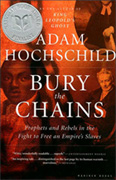 Against All Odds Against All Odds
A remarkable essay titled "Against All Odds," by Adam Hochschild, co-founder of Mother Jones magazine, is a must-read for anyone who believes that today's injustices are so entrenched that we might as well give up on achieving significant change in our lifetimes or that the efforts of a few people can't possibly impact a global problem. In it, Mr. Hochschild tells how the grassroots movement to end the practice of slavery in the British Empire was the first justice movement in human history that was joined by large numbers of people who were not themselves victims of the injustice being challenged. As he deftly illustrates, those of us working for justice today owe an incalculable debt to our forebears in the anti-slavery movement:
Though born in the age of swords, wigs, and stagecoaches, the British anti-slavery movement leaves us an extraordinary legacy. Every day activists use the tools it helped pioneer: consumer boycotts, newsletters, petitions, political posters and buttons, national campaigns with local committees, and much more. But far more important is the boldness of its vision. Look at the problems that confront the world today: global warming; the vast gap between rich and poor nations; 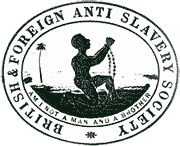 the relentless spread of nuclear weapons; the poisoning of the earth's soil, air, and water; the habit of war. To solve almost any one of these, a realist might say, is surely the work of centuries; to think otherwise is naive. But many a hardheaded realist could -- and did -- say exactly the same thing to those who first proposed to end slavery. After all, was it not in one form or another woven into the economy of most of the world? Had it not existed for millennia? Was it not older, even, than money and the written word? Surely anyone expecting to change all of that was a dreamer. But the realists turned out to be wrong. the relentless spread of nuclear weapons; the poisoning of the earth's soil, air, and water; the habit of war. To solve almost any one of these, a realist might say, is surely the work of centuries; to think otherwise is naive. But many a hardheaded realist could -- and did -- say exactly the same thing to those who first proposed to end slavery. After all, was it not in one form or another woven into the economy of most of the world? Had it not existed for millennia? Was it not older, even, than money and the written word? Surely anyone expecting to change all of that was a dreamer. But the realists turned out to be wrong.
To read of the courage and vision of those who gave decades of their lives to abolish slavery when it seemed all but impossible is to rediscover the power of altruism, and to be witness to the true potential of the human spirit. Mr. Hochschild goes on to offer a vivid snapshot of just how monumental the challenge really was:
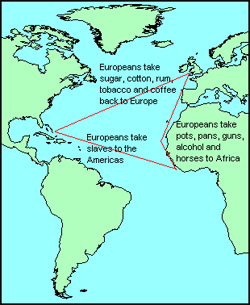 …picture the world as it existed in 1787. Well over three-quarters of the people on earth are in bondage of one land or another. In parts of the Americas, slaves far outnumber free people. African slaves are also scattered widely through much of the Islamic world. Slavery is routine in most of Africa itself. In India and other parts of Asia, some people are outright slaves, others in debt bondage that ties them to a particular landlord as harshly as any slave to a Southern plantation owner. In Russia the majority of the population are serfs. Nowhere is slavery more firmly rooted than in Britain's overseas empire, where some half-million slaves are being systematically worked to an early death growing West Indian sugar... One of the most prosperous sugar plantations on Barbados is owned by the Church of England. Furthermore, Britain's ships dominate the slave trade, delivering tens of thousands of chained captives each year to French, Dutch, Spanish, and Portuguese colonies as well as to its own. …picture the world as it existed in 1787. Well over three-quarters of the people on earth are in bondage of one land or another. In parts of the Americas, slaves far outnumber free people. African slaves are also scattered widely through much of the Islamic world. Slavery is routine in most of Africa itself. In India and other parts of Asia, some people are outright slaves, others in debt bondage that ties them to a particular landlord as harshly as any slave to a Southern plantation owner. In Russia the majority of the population are serfs. Nowhere is slavery more firmly rooted than in Britain's overseas empire, where some half-million slaves are being systematically worked to an early death growing West Indian sugar... One of the most prosperous sugar plantations on Barbados is owned by the Church of England. Furthermore, Britain's ships dominate the slave trade, delivering tens of thousands of chained captives each year to French, Dutch, Spanish, and Portuguese colonies as well as to its own.
…If you had proposed, in the London of early 1787, to change all of this, nine out of ten people would have laughed you off as a crackpot. The 10th might have admitted that slavery was unpleasant but said that to end it would wreck the British Empire's economy.
…Looking back, however, what is even more surprising than slavery's scope is how swiftly it died. By the end of the 19th century, slavery was, at least on paper, outlawed almost everywhere.
Consider how massive a societal shift the abolitionists were fighting for, and how unachievable it must have seemed to nearly everyone even a few decades before it actually happened. And, amazingly, this monumental change was wrought by the power of conscience awakening in the lives of large numbers of individual people who, in different ways, became conscientious objectors to the evils of slavery. What became an unstoppable wave of change was sparked by the efforts of a small number of visionary activists (some of whom were former slaves), educators and political leaders, using methods that are still familiar to us today.
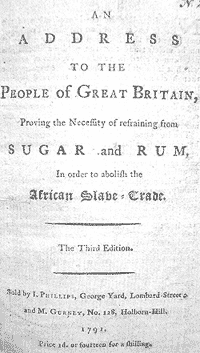 Within a few years, another tactic arose from the grassroots. Throughout the length and breadth of the British Isles, people stopped eating the major product harvested by British slaves: sugar. Clarkson was delighted to find a "remedy, which the people were taking into their own hands... Rich and poor, churchmen and dissenters... By the best computation I was able to make from notes taken down in my journey, no fewer than three hundred thousand persons had abandoned the use of sugar." Within a few years, another tactic arose from the grassroots. Throughout the length and breadth of the British Isles, people stopped eating the major product harvested by British slaves: sugar. Clarkson was delighted to find a "remedy, which the people were taking into their own hands... Rich and poor, churchmen and dissenters... By the best computation I was able to make from notes taken down in my journey, no fewer than three hundred thousand persons had abandoned the use of sugar."
…Then, as now, the full workings of a globalized economy were largely invisible. The boycott caught people's imagination because it brought these hidden ties to light. The poet Robert Southey spoke of tea as "the blood-sweetened beverage."
...Slavery advocates were horrified. One rushed out a counterpamphlet claiming that "sugar is not a luxury; but... a necessary of life; and great injury have many persons done to their constitutions by totally abstaining from it."
In spite of all that has changed in the last several hundred years, the privilege of domination -- the socially-sanctioned and often even legally-validated prerogative of one group to exert arbitrary control over members of another group -- still drives the same kind of manipulative defenses outlined by Hochschild. We can see this today with the ceaseless efforts of the meat, dairy and egg industries to convince the public that a diet based on animal products is the foundation of health and long life, when in fact it has been scientifically proven to be a major contributor to heart disease, cancer, diabetes and many other chronic illnesses our country spends billions to mitigate.
But Mr. Hochschild's essay reminds us that hundreds of years ago, such pernicious industry deceptions did not carry the day, and that people of modest means and limited formal education grasped that they had inadvertently become complicit in the systematic enslavement and exploitation of millions of others. Many simply chose to opt out, even when doing so went against their own economic interests:
Uprisings of the oppressed have erupted throughout history, but the anti-slavery movement in England was the first sustained mass campaign anywhere on behalf of someone else's rights. Sometimes Britons even seemed to be organizing against their own self-interest. From Sheffield, famous for making scissors, scythes, knives, razors, and the like, 769 metalworkers petitioned Parliament in 1789. Because their wares were sold to ship captains for use as currency to buy slaves, the Sheffield cutlers wrote, they might be expected to favor the slave trade. But they vigorously opposed it: "Your petitioners ...consider the case of the nations of Africa as their own." …Consider the Africans' case as their own? Stephen Fuller, London agent for the Jamaican planters and a key figure in the pro-slavery lobby, wrote in bewilderment that the petitions flooding into Parliament were "stating no grievance or injury of any land or sort, affecting the Petitioners themselves." He was right to be startled. This was something new in human history.
What could be more inspiring and instructive to those working for justice today?
A Cautionary Tale
Also folded within Mr. Hochschild's inspirational historical survey is a cautionary tale. As the excerpts below vividly illustrate, just as the grassroots methods pioneered by anti-slavery activists are still in use today, so are the many methods of co-option, distortion and delay that were used by those determined to maintain their privilege of domination over Africans who had been kidnapped and forced to endure the pain and degradation of lifelong servitude:
 Pro-slavery forces now launched counterattacks. They bought copies of a pro-slavery book for distribution "particularly at Cambridge" (college towns leaned left even then) and printed 8,000 copies of a pamphlet about how each happy slave family had "a snug little house and garden, and plenty of pigs and poultry." They sponsored a London musical, The Benevolent Planters, in which two black lovers, separated in Africa, end up living on adjoining plantations in the West Indies and are reunited by their kindly owners. Pro-slavery forces now launched counterattacks. They bought copies of a pro-slavery book for distribution "particularly at Cambridge" (college towns leaned left even then) and printed 8,000 copies of a pamphlet about how each happy slave family had "a snug little house and garden, and plenty of pigs and poultry." They sponsored a London musical, The Benevolent Planters, in which two black lovers, separated in Africa, end up living on adjoining plantations in the West Indies and are reunited by their kindly owners.
…They considered other P.R. techniques as well. "The vulgar are influenced by names and titles," suggested one pro-slavery writer in 1789. "Instead of SLAVES, let the Negroes be called ASSISTANT-PLANTERS; and we shall not then hear such violent outcries against the slave-trade."
…In Parliament, slavery's most colorful spokesman was the Duke of Clarence, one of the many dissolute sons of King George III. …In his maiden speech before fellow members of the House of Lords in their red and ermine robes, he called himself "an attentive observer of the state of the negroes," who found them well cared for and "in a state of humble happiness." On another occasion, he warned that Britain's abolishing the trade would mean the slaves would be transported by foreigners, "who would not use them with such tenderness and care."
While the experience of each individual and each group that has endured oppression and injustice is unique and must be recognized and respected as such, the mindset of those benefiting from the exploitation of others remains remarkably consistent across culture and context, and across the centuries. Pro-slavery advocates systematically worked to manipulate the public into focusing on the manner of treatment, rather than the injustice of the enslavement itself. The parallels with today's struggle for justice for other-than-human animals are stunning, with industry lies and manipulations shifting the emphasis towards "humane" treatment rather than questioning the privilege of domination itself.
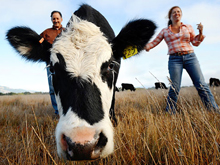 Nowhere was this more painfully evident than at the 2007 Taking Action for Animals conference, sponsored by numerous animal advocacy organizations and attended by nearly a thousand animal advocates and community educators. At one controversial presentation, rancher Nicolette Hahn Niman showed picturesque photos of animals bred into existence on her ranch to be killed after only two years of life, repeatedly attesting to her respect and affection for them as individuals, many of whom she claimed to know by name. Ms. Niman received particular praise from a representative of the Animal Welfare Institute, a conference sponsor, who said to the audience of animal advocates: Nowhere was this more painfully evident than at the 2007 Taking Action for Animals conference, sponsored by numerous animal advocacy organizations and attended by nearly a thousand animal advocates and community educators. At one controversial presentation, rancher Nicolette Hahn Niman showed picturesque photos of animals bred into existence on her ranch to be killed after only two years of life, repeatedly attesting to her respect and affection for them as individuals, many of whom she claimed to know by name. Ms. Niman received particular praise from a representative of the Animal Welfare Institute, a conference sponsor, who said to the audience of animal advocates:
The reason that we actually first began working with [Niman Ranch] was that they instituted a practice I'd never seen before, which is that the stock man and woman who work with the cattle out on the range actually go with the animals to the slaughterhouse. They clear everyone else, all the strangers, out of the slaughterhouses and walk with the animal to the staging area to its death, so that that animal has the comfort of a familiar face. And the only stranger is -- there's only one stranger for that animal in the entire process, once it's off the truck. [i.e., the person who takes the animal's life] [ Listen] Listen]
Butchering Our Language
An unforgettable scene from the documentary "Food, Inc." depicts an employee of Joel Salatin's Polyface Farm cutting the throats of fully conscious chickens while others in nearby cages are forced to witness the killing and hear the gurgling death cries of those who go before them. Meanwhile, Farmer Salatin looks on, cheerfully disemboweling a chicken carcass as he declares, "We have allowed ourselves to become so disconnected and ignorant about something that is as intimate as the food we eat. What a difference it is to be out here in the fresh air and sunshine, birds singing in the trees."
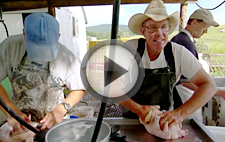 Mr. Salatin betrays no hint of irony when quoted in the media as saying he is in "the healing industry" and that his farm, where countless animals are raised and slaughtered for profit, is in fact like a "sanctuary." The appropriation of the identity of social justice activists by those benefiting from mass exploitation is nothing new. From the anti-slavery era to the present, they have concocted clever ways to warp the language of justice for their own selfish purposes. Mr. Hochschild offers us the instructive example of Henry Dundas, a skillful politician who used anti-slavery rhetoric in an attempt to hold back the anti-slavery movement. Mr. Salatin betrays no hint of irony when quoted in the media as saying he is in "the healing industry" and that his farm, where countless animals are raised and slaughtered for profit, is in fact like a "sanctuary." The appropriation of the identity of social justice activists by those benefiting from mass exploitation is nothing new. From the anti-slavery era to the present, they have concocted clever ways to warp the language of justice for their own selfish purposes. Mr. Hochschild offers us the instructive example of Henry Dundas, a skillful politician who used anti-slavery rhetoric in an attempt to hold back the anti-slavery movement.
…When Henry Dundas, the politically powerful Home Secretary who controlled a large block of Scottish votes, rose to speak, no one knew where he stood. Dundas began by declaring himself in favor of abolition, at which those in the gallery must have felt their spirits rise. He then went even further, and declared himself in favor of emancipation of the slaves... but far in the future, he added quickly, and after much preparation and education. Then, to the abolitionists' dismay, he introduced an amendment that inserted the word "gradually" in Wilberforce's motion to abolish the slave trade. This signaled the moment that comes in every political crusade, when the other side is forced to adopt the crusaders' rhetoric: The factory farm labels its produce "natural"; the oil company declares itself environmentalist. Dundas had called himself an abolitionist, but he asked that abolition be postponed.
 The role played by Dundas was not unlike that of John Mackey of Whole Foods, who was publicly lauded as a "vegan" by numerous leaders of well-known animal advocacy organizations, though he was at the time, and still is, CEO of one of the largest meat retailers in the US. From the time of its first usage in the 1940's by Englishman Donald Watson, the term "vegan" has had a very specific meaning. It refers to those individuals who, for reasons of conscience, refuse to participate in the exploitation and killing of other animals by refraining from eating, wearing or using animal products. It goes without saying that, whatever his personal dietary habits may be, Mr. Mackey, in his professional life, participates in and profits from the exploitation and killing of animals at a level of vastness equaled by few. The role played by Dundas was not unlike that of John Mackey of Whole Foods, who was publicly lauded as a "vegan" by numerous leaders of well-known animal advocacy organizations, though he was at the time, and still is, CEO of one of the largest meat retailers in the US. From the time of its first usage in the 1940's by Englishman Donald Watson, the term "vegan" has had a very specific meaning. It refers to those individuals who, for reasons of conscience, refuse to participate in the exploitation and killing of other animals by refraining from eating, wearing or using animal products. It goes without saying that, whatever his personal dietary habits may be, Mr. Mackey, in his professional life, participates in and profits from the exploitation and killing of animals at a level of vastness equaled by few.
At an animal rights conference in 2005, Gene Bauston (now Gene Baur), president of Farm Sanctuary, the largest farm animal refuge in the US, introduced Mr. Mackey, who was given the honor of keynote speaker, with these words:
Our next speaker is one powerful fella. He is one of the most influential people in the food business in this country. He also happens to be an outspoken vegan. He's spoken out publicly to major media like The New York Times, Newsweek, about being vegan. I've also had the opportunity to be in meetings with him where he is speaking with folks who are not vegan about the benefits of being vegan. So he does not shy away from who he is in speaking about what he is passionate about. He also seeks to incorporate his personal values, and desire for a more humane, more compassionate world, in the business world. [ Listen] Listen]
In this moment, the meaning of the word vegan was degraded, stripped of any connotation of what makes it a noble ideal, the commitment not to participate in exploitation for reasons of conscience. However intended, the unfortunate choice of Mr. Baur and several other well-known animal advocacy leadership figures to publicly validate Mr. Mackey's "veganism" facilitated his appropriating the moral authority of the animal advocacy movement for his own purposes.
Selling the Sell-out
Like Henry Dundas before him, John Mackey understood exactly what to do. When he began to speak, surely the heart of every animal advocate in the room surged with hope. Here was a major corporate executive who saw the tragedy of it all, the injustice, who understood.
 …Gene said something very important today when he got up to speak at lunch, and we saw those moving films about what the Humane Society of the US is doing, and all the different things they were doing to help the animal victims in Katrina. But the thing that got me was when he said, yeah, over 6 million farm animals died. You know, for every cat and dog we saved, there were 6 million farm animals that died. That's a lot of senseless death. And, God, in America, we kill — if you count the farmed catfish, I read it in a book it's up to over 11 billion animals a year. I mean it's incredible, the slaughter that's going on. [ …Gene said something very important today when he got up to speak at lunch, and we saw those moving films about what the Humane Society of the US is doing, and all the different things they were doing to help the animal victims in Katrina. But the thing that got me was when he said, yeah, over 6 million farm animals died. You know, for every cat and dog we saved, there were 6 million farm animals that died. That's a lot of senseless death. And, God, in America, we kill — if you count the farmed catfish, I read it in a book it's up to over 11 billion animals a year. I mean it's incredible, the slaughter that's going on. [ Listen] Listen]
Some of the more experienced attendees of this event have reported that their feelings of optimism evaporated as Mr. Mackey went on to explain that the only way he could stay in a position to help animals would be to continue maximizing profits through offering whatever products the public demanded. He then went on to explain in great detail his "solution," how with the assistance of numerous animal advocacy organizations, his suppliers could learn how to use and kill millions of animals with a level of compassion never before achieved at an institutional level. Hence, the genesis of Whole Foods' "Animal Compassionate Standards."
…This process is a multi-stakeholder process. And the way it works is, we brought in all these activist groups that you see down here, AWI [Animal Welfare Institute], VIVA USA, PETA, HSUS, ARI [Peter Singer's Animal Rights International] and Farm Sanctuary have all participated. [ Listen] Listen]
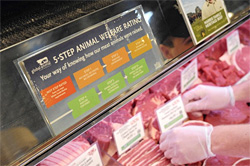 In this context, Mr. Mackey's use of the word "participated" takes on considerable significance, as it shows just how directly and deeply the values associated with veganism and animal rights were being violated. This newly anointed "vegan" visionary was not only a participant in the use and killing of animals at an unimaginable scale, but he had now created a context where many of the organizations and individuals identified in the mind of the public as the standard bearers of animal advocacy would actively join him in developing and endorsing "new and improved" methods of using and killing animals. In this context, Mr. Mackey's use of the word "participated" takes on considerable significance, as it shows just how directly and deeply the values associated with veganism and animal rights were being violated. This newly anointed "vegan" visionary was not only a participant in the use and killing of animals at an unimaginable scale, but he had now created a context where many of the organizations and individuals identified in the mind of the public as the standard bearers of animal advocacy would actively join him in developing and endorsing "new and improved" methods of using and killing animals.
…We also have the producers come in. And there's a — a species at a time, …then we have Whole Foods people that are there. We have animal experts, …they're all animal experts who care deeply about animals.
…So we're all together in this room and we basically kind of, point by point, we sort of go through it. And we're getting better at it. Boy, it took a long time to do ducks, but we're getting a lot faster with it now 'cause we've got enough species that we're beginning to learn what works and what doesn't work.
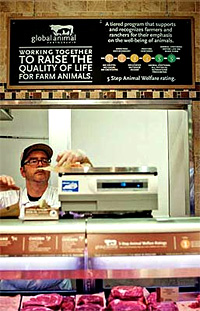 Later in Mr. Mackey's speech, it became clear just how deep the damage was going to be. Not only had he succeeded in being publicly validated as an enlightened "vegan" meat seller and won the participation and endorsement of major animal advocacy leaders. Most valuable of all, he'd figured out how to redirect the efforts of sincerely motivated animal advocates away from awakening the public to the inherent injustice of using and killing animals, and instead, toward doing the job of building the "animal-friendly" reputation of Whole Foods -- at the expense of his competitors, no less. Later in Mr. Mackey's speech, it became clear just how deep the damage was going to be. Not only had he succeeded in being publicly validated as an enlightened "vegan" meat seller and won the participation and endorsement of major animal advocacy leaders. Most valuable of all, he'd figured out how to redirect the efforts of sincerely motivated animal advocates away from awakening the public to the inherent injustice of using and killing animals, and instead, toward doing the job of building the "animal-friendly" reputation of Whole Foods -- at the expense of his competitors, no less.
…we like to say we're creating the gold standard of standards. These standards are all going to be on our web site. We want you to use those standards to go bash our competition. We want you to take those standards and pressure Safeway and Kroger and Albertsons, who say this can't be done. We want you to say, well, but Whole Foods is doing it.
During the question-and-answer portion of his presentation, when a concerned audience member asked about veal, Mr. Mackey could not help but reveal the underlying truth of the situation, the reality of the business he is in, no matter how cleverly it was marketed to animal advocates and the general public:
Whole Foods' veal is very humanely raised. It's not tethered. It's not anemic. It's -- it's humanely raised as any cow is humanely raised. So we don't see that it's -- if it's a crime to kill an adult cow, it's a crime to kill a baby calf. I mean, the same argument can be made for lamb or anything else. I mean, Whole Foods is a grocery store and our customers want to -- they want to buy dead animals, and I've already made -- I've already answered this. If we stop selling that, we're going to go out of business and -- it can't happen 'cause we can't -- I can't stop it. That's the bottom line. [ Listen] Listen]
What did these standards, developed through the collaboration of animal exploiters, sanctuaries, and animal rights advocates, actually consist of? Here's an excerpt from the Whole Foods Market Natural Meat Program and Animal Compassionate Standards for Pigs:
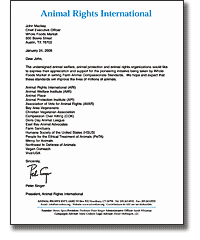 If an illness or injury is serious enough for the animal to be killed, the animal must be promptly and humanely euthanized on the farm. Although at this time there are few alternatives to blunt trauma for piglets, there is research being conducted to develop more humane euthanasia possibilities for neonates. If an illness or injury is serious enough for the animal to be killed, the animal must be promptly and humanely euthanized on the farm. Although at this time there are few alternatives to blunt trauma for piglets, there is research being conducted to develop more humane euthanasia possibilities for neonates.
In the day-to-day world of animal agribusiness, which is ultimately governed by the laws of economics, this lofty-sounding language could be translated roughly as follows: "If an animal gets sick, and treating her will cost more than her cash value, we will kill her in the nicest way we can, as long as it doesn't cost too much. In the case of baby pigs, this means bashing them in the head with a club or hammer. But we're looking for a nicer way to do it."
This is just one example of what John Mackey described in his speech as "the gold standard of standards." Ironically, despite their endorsement by 17 animal advocacy organizations including two nationally-known farm animal sanctuaries, and despite the chorus of accolades Whole Foods received in the major media, cementing this corporation's reputation as being "animal friendly," these "Animal Compassionate" standards were never even implemented.
Global Animal Movement Co-option
Now, several years later, Mr. Mackey has launched a "new and improved" standards initiative, one that confuses the public and entangles advocacy organizations even more profoundly than before. This time around, he's chosen to omit the word "compassion" from the title, perhaps after finding that even he couldn't quite sell the concept of "animal compassionate veal" to either animal advocates or the public. The conspicuously trademarked title for the new program is a more technical-sounding, yet equally misleading, PR concoction: "Global Animal Partnership's 5-Step™ Animal Welfare Rating Standards."
The Global Animal Partnership, the organization formerly known as Whole Foods' Animal Compassion Foundation, is headed up by Miyun Park, who not long ago was widely admired by many animal advocates, including this one, for her role in bringing "open rescue" to the US, a method of investigating and exposing the realities of animal exploitation that was pioneered (and is still being practiced) in Australia by Patty Mark of Animal Liberation Victoria.
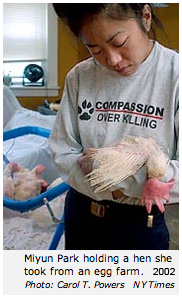 Moving from grassroots role model to a position as Vice President of HSUS, Ms. Park offers the Global Animal Partnership a potent combination of activist credibility and corporate savvy. Now, as executive director of an organization whose work will undoubtedly enhance shareholder value for Whole Foods, one of the largest retailers of animal products in America, her unlikely journey validates industry efforts to convince their customers that purchasing the "right kind" of animal products is a form of socially responsible activism. Moving from grassroots role model to a position as Vice President of HSUS, Ms. Park offers the Global Animal Partnership a potent combination of activist credibility and corporate savvy. Now, as executive director of an organization whose work will undoubtedly enhance shareholder value for Whole Foods, one of the largest retailers of animal products in America, her unlikely journey validates industry efforts to convince their customers that purchasing the "right kind" of animal products is a form of socially responsible activism.
The success of this admittedly brilliant strategy is illustrated by the slew of media stories in recent years about vegans and vegetarians going back to eating meat, many of them describing this choice as a form of activism (here's just one example). There have even been stories about "vegan" and vegetarian butchers (see here and here). This parallels, and reinforces, the demoralizing impact on animal advocates of sanctuaries endorsing "humane" farming legislative coalitions, reinforcing the myth that consuming "humane" animal products is somehow an act of social justice.
The 5th Step™ of the standards Mr. Mackey and his team at the Global Animal Partnership have created is described thusly: Animal centered; all physical alterations prohibited. Animals get to live their whole lives with all the body parts they were born with.
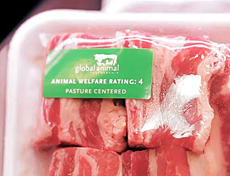 This can be likened to the work of a skilled magician, who dangles a shiny bauble in front of his audience with his right hand in order to distract from what he does with his left. In this case, Mr. Mackey, himself anointed a "vegan" visionary by a virtual Who's Who of animal advocates, dangles in front of us the arresting image of former undercover investigator Miyun Park collaborating with the most "forward-thinking" people in the animal industry. Together, they have at last created a methodology for using and killing millions of animals that the public can feel good about. At Step 5™, the animals "get to live their whole lives with all the body parts they were born with" (magician's right hand). But (furtive left hand), when their economic value reaches its peak, typically in the animals' early adolescence, they will be killed and their bodies unceremoniously dismembered, the parts wrapped up in attractive packages and sold off one by one to well-meaning customers at a premium price. This can be likened to the work of a skilled magician, who dangles a shiny bauble in front of his audience with his right hand in order to distract from what he does with his left. In this case, Mr. Mackey, himself anointed a "vegan" visionary by a virtual Who's Who of animal advocates, dangles in front of us the arresting image of former undercover investigator Miyun Park collaborating with the most "forward-thinking" people in the animal industry. Together, they have at last created a methodology for using and killing millions of animals that the public can feel good about. At Step 5™, the animals "get to live their whole lives with all the body parts they were born with" (magician's right hand). But (furtive left hand), when their economic value reaches its peak, typically in the animals' early adolescence, they will be killed and their bodies unceremoniously dismembered, the parts wrapped up in attractive packages and sold off one by one to well-meaning customers at a premium price.
And so this brings us full circle, because now, the elusive logic of Mr. Salatin's outrageous likening of his farm to a sanctuary for the animals he kills becomes more apparent. Just as numerous animal organizations and sanctuaries are stepping forward to publicly validate the concept of "humane" farming in the context of statewide legislative initiatives, the Global Animal Partnership unveils an approach to using and killing animals that can be touted to farmers as more profitable and, to the buying public, as healthier, sustainable and more kind.
As educator and former-farmer Harold Brown has pointed out, these very talking points -- healthier, sustainable, and more kind -- are some of the key benefits legitimately ascribed to a diet free of animal products. Their use in an animal farming context maximizes public confusion and greatly facilitates the conversion of animal activists into advocates for "humane" agriculture. They merely have to be convinced that the most effective way to "decrease suffering" is to transfer some of the same arguments they once made to discourage the consumption of animal products into the promotion of "humane" animal products such as "cage-free" eggs. That doing so involves deliberately misleading the public about the injustices inherent in the production of such products is simply never addressed. Nor is the fact that suffering is an internal subjective experience, whose increase or decrease can no more be rationally quantified than the increase or decrease of love or sadness. More or less, the authority figure who most convincingly states which course of action "decreases suffering the most" gains the ability to violate basic principles of public integrity, and to righteously exhort countless well-meaning animal advocates to do the same.
Doing the Wrong Thing the "Right" Way
The image Mr. Salatin is constructing for himself actually goes beyond his merely meeting the demand for "natural," "wholesome" and "humane" animal products. It even includes his providing customers with a sense of meaning, with the feeling of being a part of making the world whole again. By characterizing himself as a "healer" offering "sanctuary" to animals whom he has in fact bred into existence only to butcher for the sake of profit, Mr. Salatin makes it possible for the purchase and consumption of the products of exploitation to be experienced by his customers as an expression of self-care, environmental sanity, compassion, and even activism.
Master marketer John Mackey, by making this experience available on a mass scale, will no doubt gain a legion of eager and enthusiastic customers. At a recent event at a Whole Foods store in central Florida, a large display was set up in front of the meat cases to publicize the rollout of the new 5 Step™ standards. Cattleman Will Harris was observed handing out meatballs on toothpicks to passing shoppers, inviting them, in his charming Southern drawl, to "come on and try a bite of one of my happy cows." When asked by a skeptical customer if the cows were happy to die, he simply turned away.
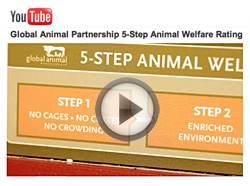 An infomercial being used to promote Whole Foods' new program offers idealized images of cows, pigs and chickens in sunny green pastures with cheerful music under upbeat narration by GAP executive director Miyun Park, Whole Foods staffers, and a number of farmers. In many different ways, the message is sent that people working with Whole Foods are doing everything possible to make things better for the animals they use and kill by the millions on the public's behalf, and that their new program is ushering in a new era of enlightenment and ever-expanding progress. Those who appear in the video communicate boundless confidence and optimism, and most of all, an in-depth knowledge of, and concern for, the well being of animals. Impressive claims are made about an abiding interest in helping the animals thrive, in letting them live as they were meant to live. No acknowledgement whatsoever is made of the fact that all of these animals will be killed long before they even reach full maturity, and that before that final and inescapable injustice, their bodies will have been forcibly mutilated in various ways, their reproduction controlled, their relationship to family members subsumed to the brutal dictates of economics, which typically means that offspring are prematurely taken away, or even immediately sent off and killed when their existence presents an unwanted drain on profits. An infomercial being used to promote Whole Foods' new program offers idealized images of cows, pigs and chickens in sunny green pastures with cheerful music under upbeat narration by GAP executive director Miyun Park, Whole Foods staffers, and a number of farmers. In many different ways, the message is sent that people working with Whole Foods are doing everything possible to make things better for the animals they use and kill by the millions on the public's behalf, and that their new program is ushering in a new era of enlightenment and ever-expanding progress. Those who appear in the video communicate boundless confidence and optimism, and most of all, an in-depth knowledge of, and concern for, the well being of animals. Impressive claims are made about an abiding interest in helping the animals thrive, in letting them live as they were meant to live. No acknowledgement whatsoever is made of the fact that all of these animals will be killed long before they even reach full maturity, and that before that final and inescapable injustice, their bodies will have been forcibly mutilated in various ways, their reproduction controlled, their relationship to family members subsumed to the brutal dictates of economics, which typically means that offspring are prematurely taken away, or even immediately sent off and killed when their existence presents an unwanted drain on profits.
But these are all things absent from the video, and being absent, will not trouble the conscience of nearly all who view it. In so many ways, this engaging and impressively persuasive production brings home just how far Mr. Mackey's efforts have progressed. His former "animal compassionate" standards program was aimed at making his customers believe they were being good, kind and "socially responsible" by buying animal products from him. But his new, more intricately constructed program speaks to something even more primal, and perhaps irresistible.
The message now being sent by Mr. Mackey and all the animal advocacy organizations collaborating with him could not be more clear. When we purchase and consume animal products from Whole Foods Market, we are not participating in the exploitation of others, we are not ingesting the products of injustice. Rather, we are eating happiness. The animals are happy. Our buying and eating them supports the system that makes them happy. And the delightful, wholesome, guilt-free taste of their flesh and by-products makes us happy in turn. It is no mistake that so much of the footage depicting the lives of animals on farms associated with Whole Foods bears a striking resemblance to the kind of footage animal sanctuaries show to illustrate their commitment to offering a measure of safety, and yes, happiness to those few lucky enough to have escaped the voracious system of exploitation that consumes the lives of their kind by the billions. As time passes, it is harder and harder for the public to distinguish animal advocates from animal exploiters, and incredibly, animal sanctuaries from farms where countless animals are brought into existence and methodically killed. Such is the hidden power of the modern public relations industry.
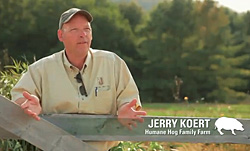 As the promotional video comes to its conclusion, Jerry Koert of Humane Hog Family Farm rhapsodizes on what he appears to believe is the near paradise he's created for the pigs he has bred into existence, and will soon kill: As the promotional video comes to its conclusion, Jerry Koert of Humane Hog Family Farm rhapsodizes on what he appears to believe is the near paradise he's created for the pigs he has bred into existence, and will soon kill:
With the pigs outside, it's unbelievable. They are running around, they are enjoying the sunlight. You'll see them rooting -- I mean, their natural behavior! You can't get any nicer than that! …They're playing, they are running around in a manner -- I'd have to say… they're happy!
It is impossible to deny the disquieting similarity of this deceptive hyperbole to the pro-slavery propaganda Mr. Hochschild brings us from the distant past:
…before Parliament could act, there were lengthy hearings. Witnesses like James Penny, a former captain, made the slaves on the middle passage sound almost like cruise passengers: "If the Weather is sultry, and there appears the least Perspiration upon their Skins, when they come upon Deck, there are Two Men attending with Cloths to rub them perfectly dry, and another to give them a little Cordial... They are then supplied with Pipes and Tobacco.... They are amused with Instruments of Music peculiar to their own country... and when tired of Music and Dancing, they then go to Games of Chance."
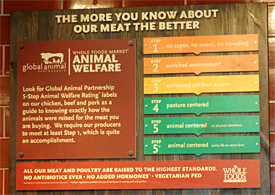 That those profiting from animal exploitation would concoct an elaborate façade to obscure the true nature of their horrific activities is inevitable. Such PR methods go back hundreds of years in the traditions of mass exploitation. The tragedy in all this is that so many animal advocacy organizations and former animal rights activists are needlessly participating in a charade that the industry would quite enthusiastically carry out on its own. As it is, the Global Animal Partnership's Board of Directors includes, along with Mr. Mackey and a number of other meat industry executives, the CEO of HSUS, the CEO of The World Society for the Protection of Animals, the Chair of Compassion in World Farming, and a consultant for People for the Ethical Treatment of Animals. One can hardly imagine a more ringing endorsement of the products of exploitation and killing, or a more compelling cause of confusion amongst those many members of the public who have genuine concern for the well being of animals. The problem traces back not just to a philosophical contradiction, or even a strategic blunder, but rather, a widespread breakdown in the practice of public integrity. Are these participating animal advocacy organizations telling the public the truth? In my opinion, they are not. That those profiting from animal exploitation would concoct an elaborate façade to obscure the true nature of their horrific activities is inevitable. Such PR methods go back hundreds of years in the traditions of mass exploitation. The tragedy in all this is that so many animal advocacy organizations and former animal rights activists are needlessly participating in a charade that the industry would quite enthusiastically carry out on its own. As it is, the Global Animal Partnership's Board of Directors includes, along with Mr. Mackey and a number of other meat industry executives, the CEO of HSUS, the CEO of The World Society for the Protection of Animals, the Chair of Compassion in World Farming, and a consultant for People for the Ethical Treatment of Animals. One can hardly imagine a more ringing endorsement of the products of exploitation and killing, or a more compelling cause of confusion amongst those many members of the public who have genuine concern for the well being of animals. The problem traces back not just to a philosophical contradiction, or even a strategic blunder, but rather, a widespread breakdown in the practice of public integrity. Are these participating animal advocacy organizations telling the public the truth? In my opinion, they are not.
A Failure of Imagination
What if anti-slavery leaders had, instead of focusing their energies on helping the public understand the inescapable injustice of slavery, held up as visionaries those who designed new and improved slave ships with better ventilation and "stacking densities" low enough that captives could turn around as they lay chained below decks? What if they had publicly partnered with "progressive" slaveholders to develop standards for "humane" slavery and encouraged members of the public concerned about the well-being of enslaved people to purchase sugar from "humane" plantations where the use of rubber-coated whips prevented permanent scarring? As misguided as such activities may seem to us now, are they that different from the kinds of campaigns now being carried out by some of today's most well-funded animal advocacy organizations?
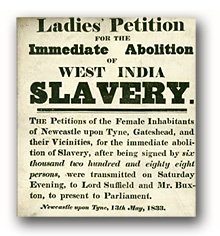 Vast numbers of ordinary folk in 18th and 19th century England were capable of understanding why enslaving other humans was wrong, and of taking action to stop it for reasons of conscience. Why, then, do the leaders and spokespeople of today's dominant animal advocacy organizations actively promote the idea that most people are so incapable of understanding, so devoid of compassion and respect for justice, that a widespread movement of non-participation in animal exploitation is neither possible nor practical? Vast numbers of ordinary folk in 18th and 19th century England were capable of understanding why enslaving other humans was wrong, and of taking action to stop it for reasons of conscience. Why, then, do the leaders and spokespeople of today's dominant animal advocacy organizations actively promote the idea that most people are so incapable of understanding, so devoid of compassion and respect for justice, that a widespread movement of non-participation in animal exploitation is neither possible nor practical?
In a 2009 conference presentation, author and former HSUS staffer Norm Phelps argued that historical anti-slavery activists had many powerful advantages on their side that today's animal advocates simply do not, including the ability to directly collaborate with formerly enslaved people who could offer compelling firsthand testimony of the injustices they both endured and witnessed. Yet today, those of us who wish to awaken public understanding about the plight of other-than-human animals have the advantage of access to technologies that can be used to organize our efforts and to produce and disseminate complex print and video messages on a massive scale, such tools now available to people of ordinary means that even the most privileged justice advocates of previous generations could not imagine, much less hope to possess. The ready availability of these powerful tools has brought with it an emerging global activist culture, which offers the potential to distribute life-changing information to millions of people.
Further, unique to our times and this particular justice cause, animal agriculture is one of the single greatest contributors to the processes now widely understood to be destroying our ecosystem: global warming, overconsumption and pollution of fresh water, soil erosion and deforestation, to name a few. It is projected that by the end of this century, half of the species now alive will vanish forever. On the way to this dismal future, the lives of uncountable individuals, human and other-than-human alike, will be thrust into misery and brought to a premature end. This is the single greatest wake-up call in human history, a four-alarm fire consuming our collective future at an ever-increasing rate.
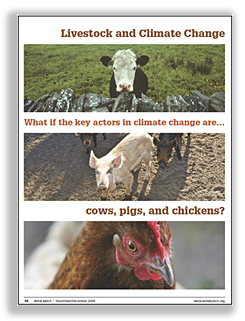 As this catastrophic reality impinges on our lives in increasingly obvious ways, the potent combination of conscience and the drive for self-preservation is leading more and more of us to overcome the psychological and social barriers to moral awakening and empowered action, opening the door to what could fairly be called one of the teachable moments of the century. As most recently validated in a Worldwatch Institute report titled Livestock and Climate Change and a United Nations report titled Assessing the Environmental Impacts of Consumption and Production, one of the only courses of action that could conceivably turn the global situation around in time to bring our ecosystem back into balance is the widespread adoption of a diet free of animal products. Yet is it an accident that so few people worldwide are even aware of this potentially ecosystem-saving truth? Have those who have collected the greatest amount of funding and cultivated the most media attention in the name of animal advocacy been drawn into a deadly dance with the animal-exploiting industry, their influence and potential co-opted in service of creating a new and highly profitable market for "humane" animal products, while our ecosystem moves toward collapse before our very eyes? As this catastrophic reality impinges on our lives in increasingly obvious ways, the potent combination of conscience and the drive for self-preservation is leading more and more of us to overcome the psychological and social barriers to moral awakening and empowered action, opening the door to what could fairly be called one of the teachable moments of the century. As most recently validated in a Worldwatch Institute report titled Livestock and Climate Change and a United Nations report titled Assessing the Environmental Impacts of Consumption and Production, one of the only courses of action that could conceivably turn the global situation around in time to bring our ecosystem back into balance is the widespread adoption of a diet free of animal products. Yet is it an accident that so few people worldwide are even aware of this potentially ecosystem-saving truth? Have those who have collected the greatest amount of funding and cultivated the most media attention in the name of animal advocacy been drawn into a deadly dance with the animal-exploiting industry, their influence and potential co-opted in service of creating a new and highly profitable market for "humane" animal products, while our ecosystem moves toward collapse before our very eyes?
Given the urgency of our planetary situation, do we really have the time and resources to spend decades on husbandry reform campaigns built around coalitions with animal-exploiting corporations, collaborations that compromise the integrity of animal advocates and confuse the public? Given the blatant injustice experienced by each individual animal who is brought into existence by the industry -- every aspect of his or her life controlled -- and then killed, can any sincere advocate continue to justify promoting to the public alternative "humane" animal products that they themselves would not consume for reasons of ethics?
A Noble Tradition
Why can't we start conceiving of ourselves, and start acting, as advocates working in the social justice tradition rather than as "customers" of advocacy conglomerates whose programs are so often optimized to maximize fundraising potential with little evident concern for the damage done to the foundations of fundamental change? Why not resolve today to walk away from what is so clearly a corporatized advocacy model broken beyond all hope of repair, and instead, apply our time and resources to building a solid foundation for the end of this unjust and ecologically self-destructive way of relating to our fellow beings?
Helping animals now and in the future does not require collaborating with the animal-exploiting industry, misleading the public, promoting "humane" animal products, or otherwise violating our values and trading away the foundations of long-term change. There are far better ways to work for change that we can be confident will help, and not hurt. For example:

- We can start by helping as many people as possible understand who animals are, why it is morally wrong to use and kill them, and how the solution to numerous public health, social, economic and environmental problems of catastrophic proportions is the widespread adoption of a diet free of animal products.
- We can work toward bringing an end to the use of animals for food, clothing, research and entertainment, and support the development and widespread adoption of animal-free alternatives to these products and practices.
- We can relentlessly expose the injustices committed by the animal-using industry and the misleading tactics used by those who enable it.
- We can rescue and offer sanctuary to animals enduring neglect, abuse, exploitation, or facing premature death.
- We can oppose the exotic pet trade and the breeding of companion animals, and support the "No Kill" movement.
- We can protect and restore the habitat of free-living animals and stand up for their right to exist on their own terms.
- We can be positive role models by striving to live ever more free of participation in the exploitation of others.
- We can support the efforts of those leading other movements for justice and environmental sanity.
- We can share with other people uncompromised versions of the same truths that inspire our own efforts to work for change.
Such life-affirming activities speak to what is best in human potential, and are inherently more difficult for those in the animal-exploiting industry to derail, discredit, or co-opt in service of their destructive agenda.
In every era, there have been those who intuitively grasped that oppressing and exploiting others was neither right nor necessary, and that we as human beings can choose another way to be in the world. Both the modern women's movement and some of the initial efforts to advocate for animals were advanced by those first inspired by the anti-slavery movement. Today’s animal advocates face monumental challenges in bringing about the end of socially-sanctioned and legally-protected exploitation and killing. The ills of prejudice, abuse and subjugation run deep in our collective psyche, and overcoming them is never ending work. Yet consider what might be possible if we strive to follow the example of a handful of people whose courage, integrity and vision sparked a global shift in consciousness, inspiring millions to join the effort to bring a terrible injustice to an end, against all odds.
Let's not give up before we even get started.
For more on the techniques used by exploitative industries to disable and co-opt grassroots justice movements, see Invasion of the Movement Snatchers: A Social Justice Cause Falls Prey to the Doctrine of "Necessary Evil"
To learn more about the British anti-slavery movement, see Adam Hochschild's book, Bury the Chains: Prophets and Rebels in the Fight to Free an Empire's Slaves
To learn more about the shocking prevalence of slavery in the modern world and efforts to abolish it, see Anti-slavery: today's fight for tomorrow's freedom
Copyright © 2011 Tribe of Heart Ltd. All rights reserved. |
